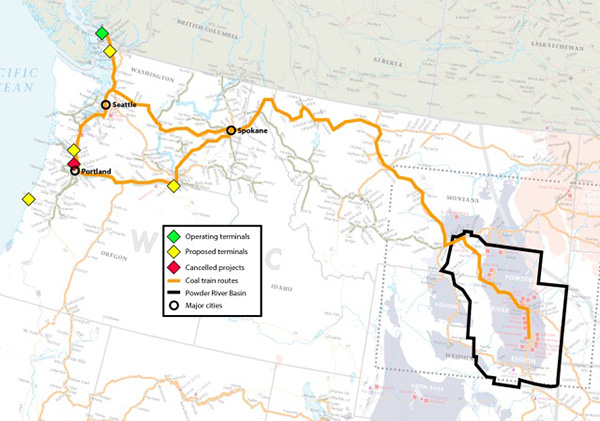Articles Menu
Americans reject terminals, so Montana’s coal heads to Asia through the Lower Mainland.
If you’ve ever been to the ferry terminal in Tsawwassen, you’ve seen them. The big, black piles of coal framed against the mountains as you drive down the causeway. But not all coal is created equal.
One day the train crawling past beachgoers and tourists might be from Teck’s Elkview mine in the Kootenays. Its load of metallurgical coal will sail away on a bulk carrier, perhaps to a steel foundry in Seoul.
Under the province’s $30-a-tonne carbon tax, every 100 train cars of B.C. coal represents about $45,000 in revenue for the government. Compensation to the public, in its way, for some of the pollution created by that coal’s extraction, processing and transport.
But the next day a whistle blows and another train rumbles toward the Westshore Terminals dock. This one is carrying thermal coal from Montana, bound for a massive power plant, perhaps in Korea.
Although its impacts on climate and health are even worse than steelmaking coal, this American coal train pays no carbon tax, or comparable regulatory fee in B.C., leaving taxpayers like you and me with the tab for its harmful effects.
So, why are U.S. thermal coal trains crossing the border in the first place?
The short answer is that Washington and Oregon don’t want them. Under pressure from their constituents, county and state governments put the brakes on new export terminals and coal trains bringing more dirty coal through their communities. Native American tribes directly affected by these proposals led the charge.
Thanks to our existing terminals and growing port capacity, B.C. is the last hope for desperate coal producers in the Powder River Basin hoping to get their product to market before thermal coal goes the way of the dodo.

That means more U.S. thermal coal leaving the continent through B.C. ports, where companies know they get a free ride. But it’s not free for the people who live here. Coal shipments can sully our health, our infrastructure and, eventually, our climate — even if the product is burned across the Pacific.
If the provincial government wanted to, it has the power to recoup some of these costs under the Climate Leadership Plan. We can’t apply the carbon tax to coal mined outside our borders, but we could impose an equivalent levy.
This regulatory fee would level the playing field with B.C. coal producers and ensure all exporters pay something to mitigate the adverse impacts of their industry.
Why haven’t the governing BC Liberals implemented this common-sense policy? Political donations from U.S. thermal coal players like Burlington Northern Santa Fe and Fraser Surrey Docks might give us a hint. Together, they’ve donated tens of thousands of dollars to the governing party, with high hopes the coal terminal proposed at Fraser Surrey Docks becomes a reality.
Regardless, this is a failure of climate and economic leadership.
Under the banner of “climate action,” Premier Christy Clark touts fracked gas from B.C. as the way to wean China from its addiction to dirty coal. At the same time, her government turns a blind eye to coal trains carrying more thermal coal exports to Asia.
The citizens of this province shouldn’t have to subsidize a dying industry from which we get none of the benefits, but all of the risk. It’s time to end the free ride for U.S. thermal coal.